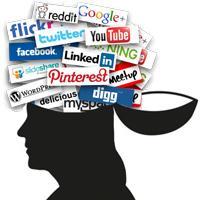 Wait. What? Low GPAs cause increased social media use? That doesn’t make any sense–or does it? A recent study in the journal Emerging Adulthood reports findings on the relationship between media use and GPA. The researchers’ findings suggest that high social media use, in contrast to, say, media like books or music, was correlated with lower GPA among female college freshmen. This is a good piece of research and it does a good job of displaying the central role of media use in the lives of young adults. They also do a very nice job of the academic grounding around the topic and a thoughtful analysis of implications. But what’s getting traction? Headlines warning that social media may tank your kid’s grades (e.g., Social Media, Facebook & Twitter Use May Harm Grades of College Freshman) which are both attention-getting and inaccurate. Sorry to disappoint if you were hoping for a quick fix, but that’s not exactly what the study results mean.
Wait. What? Low GPAs cause increased social media use? That doesn’t make any sense–or does it? A recent study in the journal Emerging Adulthood reports findings on the relationship between media use and GPA. The researchers’ findings suggest that high social media use, in contrast to, say, media like books or music, was correlated with lower GPA among female college freshmen. This is a good piece of research and it does a good job of displaying the central role of media use in the lives of young adults. They also do a very nice job of the academic grounding around the topic and a thoughtful analysis of implications. But what’s getting traction? Headlines warning that social media may tank your kid’s grades (e.g., Social Media, Facebook & Twitter Use May Harm Grades of College Freshman) which are both attention-getting and inaccurate. Sorry to disappoint if you were hoping for a quick fix, but that’s not exactly what the study results mean.
Overuse of social media might be the symptom, not the cause
The study’s findings are correlational, not causal. In other words, all the headlines saying that ‘social media may harm your kids grade point average’ are inaccurate just as mind is above. The results of the study say that social media use may be an indicator of or related to (not the cause of) lower GPAs or, equally, that lower GPAs might be an indicator of or related to (not the cause of) higher social media use.
 Other things we know about young women —actually all young adults — in their first year in college is that some adjust better than others. Some struggle with the newly found freedom and have trouble balancing social life and academics. This was true long before social media. One college president routinely reassures visiting parents on Parent’s Weekend that a freshmen wanting to transfer to a different school was actually the norm rather than the exception. They don’t call it the Freshmen blues for nothing.
Other things we know about young women —actually all young adults — in their first year in college is that some adjust better than others. Some struggle with the newly found freedom and have trouble balancing social life and academics. This was true long before social media. One college president routinely reassures visiting parents on Parent’s Weekend that a freshmen wanting to transfer to a different school was actually the norm rather than the exception. They don’t call it the Freshmen blues for nothing.
Around the age of 18, college freshman of both genders are on a developmental path to establish an identity as an adult and to emancipate emotionally from their family of origin so that they can go out and find their path in the world. The urge to connect socially is part of that—young people tend to focus more on peer connections during this period. At the same time, spending an extended period away from home, family, friends, the dog and familiar places and routines is scary, lonely, and difficult at any age. When our college-age kids showed up for a weekend (with dirty laundry), they lounged about like they were still 9 years old rather than able-bodied adults. We used to remind ourselves “they’re big, but they’re little” so we could be compassionate instead of impatient—or jealous. As most of us know, being an adult is not all it’s cracked up to be, so it made sense that they might want take a bit of a developmental hiatus while they still could.
Research findings have also shown that overuse of many digital activities, such as social media, Internet surfing, or gaming can be indicators of depression. The same, however, can be said of beer-drinking, partying or shopping at the local mall. Some earlier findings have suggested that females and minority students are more likely to feel a loss of control and alienation than white males. Loneliness and small social network support has been associated with lower levels of antibody response. In the Walsh et al study, the participants reported the number of minutes they used social media, not the size of their social networks, which might be an interesting question.
The prevalence of peer-to-peer communications, the biological drive to connect, and the ease of access to social media, might also suggest to educators that it’s time to think about using new communications models to engage students in lieu of a passive lecture hall model. Lecture halls have always been boring, but social media provides a pretty easy escape. Research findings have suggested that the human brain doesn’t completely develop until the early 20s, so it’s not a shocker that young people do are not always able to exercise wisdom and foresight or to see the long game rather than respond to a text about the next kegger location.
But most of all, we have to remember that learning balance and self-control comes from practice. And, unfortunately, the best way to see the implications of bad choices is to get undesirable results. But before we fix a problem by automatically assuming that a dipping GPA is due to high social media use, we might want to check what else is going on—overuse of social media might well be the symptom, not the cause. We also have to be careful when we read study results that we aren’t just confirming our own biases. When it “makes sense” to those who view social media as a waste of time that higher social media use would cause grades to fall, then inaccurate headlines get embraced as ‘facts’ and passed around. We humans often don’t question what we believe and we are very good indeed at finding what we expect to see. If your kid is on the receiving end of a declining GPA, it’s important to investigate with an open mind. Of course, it might be over-indulgence in online socializing (although that rarely happens without the equivalent over-indulging in offline socializing), but the expectation that social media is to blame might keep you from seeing something more fundamental that is driving their relentless urge to connect socially, like loneliness, depression, or feeling alienated and overwhelmed.
Cross-posted in Psychology Today Positively Media.
—–
Walsh, J. L., Fielder, R., Carey, K. B., & Carey, M. P. (March 26, 2013). Female College Students’ Media Use and Academic Outcomes: Results from a Longitudinal Cohort. Emerging Adulthood, from http://eax.sagepub.com/content/early/2013/03/05/2167696813479780.

